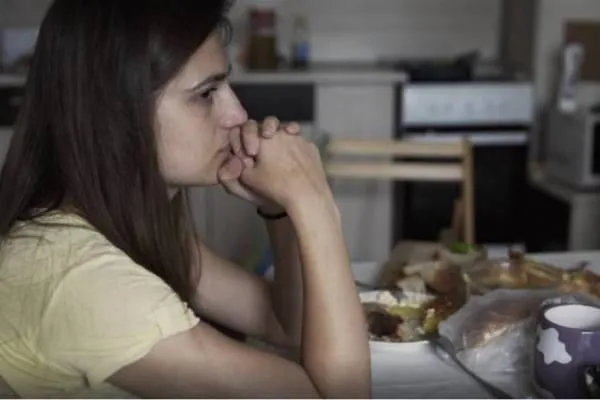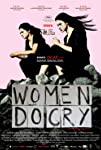Eye For Film >> Movies >> Women Do Cry (2021) Film Review
Women Do Cry
Reviewed by: Jennie Kermode

Sonja (Maria Bakalova) and Lora (Ralitsa Stoyanova) fight in the way that only sisters can. There’s a deep and abiding pettiness to their interactions; they are vicious over small things, yet unable to get away from each other, forced by their mother to make peace when it gets out of hand. Lying on a bed together, they share moments of bonding as they pet tiny kittens. No subject is off-limits between them. Those small things spark real hatred, but when it comes to the big things, they have each other’s backs – and that’s something which Sonja is going to need.
Sonja’s happy-go-lucky approach to life comes to an abrupt end one day when she finds out, all at once, that the older man she has been sleeping with is married to someone else, has a young child, and is HIV positive. Before long she learns what seems, from a narrative point of view, to be inevitable: she too has the virus. This is the 21st Century and as her doctor explains, HIV is no longer a death sentence. With the right medication, she could live healthy for a normal lifespan. That’s the science, though. The stigma is something else. Many people in Bulgaria (as in some other parts of the world) regard people with HIV as untouchable.
The film charts Sonja’s initial panic, her experiences with prejudice, her desire to fight the stigma and the damage that it does her nonetheless. Throughout all this, Lora strives to be there for her, to help her adjust, to keep her alive and get he back on an even keel. While Lora seeks new ways of understanding herself, at one time joining a cult and seeking a spiritual cure which might be harmless were it not that it persuades her to refuse medication, Lora finds a source of support in the LGBTQ rights movement, where HIV is understood in a much more straightforward and practical way.
Bulgaria is a country in flux. The news features protests by groups campaigning against gender recognition for trans people. Sonja and Lora’s own cousin is a trans man who has felt unable to transition due to stigma, and even comes under pressure from his own girlfriend to repress his gender. Politicians make cheap capital out of ridiculing the idea of a third gender, whilst plainly knowing nothing about it. The family patriarch spouts similar rhetoric at the dinner table, and suddenly, because of the shift in the family’s alignment which Sonja’s diagnosis has brought, it triggers anger where it might have been ignored before.
Homophobia and transphobia are closely tied to misogyny. Some viewers will find the hatred displayed towards women in this film difficult to stomach. it’s not just the direct nastiness, however – it’s the sense of entitlement displayed by the male characters, the disregard which many of them exhibit towards women, the way that those women are left to deal with the mess when they move on. Sonja gets no support from her lover. Her aunt, Veronica (Bilyana Kazakova), struggles to cope alone with the world’s angriest baby, at one point contemplating suicide. She is watched by a grey cat which looks perpetually confused by the behaviour it observes. Occasionally, however, the women and queer characters get together and find understanding, strength, even moments of joy.
Bakalova, who will be familiar to many English-speaking viewers from her multi-award winning turn in Borat Subsequent Moviefilm, shows great depth here in a performance which is equally deserving of notice. It’s another contentious role, a bold choice for a young actor, but she handles it with dignity and assurance even at those times when her character seems bereft of both.
On a pillar outside the hospital where Sonja is treated, a stork has built its nest. It is observed with fascination, an omen of a better future, and when it is injured, the skilled staff rush to save its life. In Bulgarian myths, storks (which disappear for part of the year on long migrations) are often depicted as capable of transforming into humans. If they can do so, and can command such respect, the film seems to suggest, perhaps one day women can be recognised as fully human, too.
Reviewed on: 17 Mar 2022

















